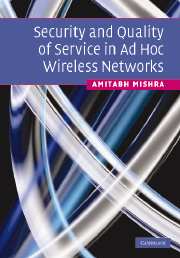7 - Secure routing
Published online by Cambridge University Press: 26 February 2010
Summary
In an ad hoc network, each node is expected to forward the packets of its immediate neighbor to a node closer to destination. Without cooperation of the nodes in the neighborhood, a packet cannot make its journey from a source to destination. If the neighboring nodes are selfish or compromised, then the correct forwarding of the packets through them may not be possible. Compromised nodes often subvert the underlying routing protocol in such a way that a packet gets forwarded to an arbitrary destination, where packets may be subjected to content modification, identity tampering, or simply dropped. This chapter examines the problem of securing the routing protocols of ad hoc networks.
Security aware routing
The desirable properties of a secure route, which are timeliness, ordering, authentication, authorization, data integrity, confidentiality, and non-repudiation are summarized in Table 7.1. The table also indicates the well known techniques that are often employed in practice in achieving these properties in a routing protocol. For example, time stamps are used to ensure timeliness and sequence numbers are used in packet headers to ensure ordering of the routing messages.
The route discovery process is an integral part of a routing protocol, which finds paths between a source–destination pair. When a route discovery process is initiated to find a path that satisfies certain specific criteria such as QoS constraints and if such a route is indeed found, then such a routing protocol is known as a QoS-aware routing protocol [1].
Information
- Type
- Chapter
- Information
- Security and Quality of Service in Ad Hoc Wireless Networks , pp. 129 - 146Publisher: Cambridge University PressPrint publication year: 2008
